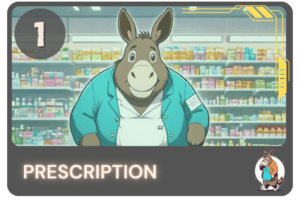Run Donkey Food Is Chasing You
Want Food To Chase You Instead of Other Way Around
Find The Right Appetite Supressant

Appetite suppressant ranking list
The Science Behind Appetite Suppressants: What You Need to Know
Ever wonder why that second slice of pizza often feels more like a want than a need? It’s all in your head—literally. Appetite suppressants help the brain’s traffic lights turn red, signaling when it’s time to brush our hands and say, “I’m good.”
By delving into biology, psychology, and chemistry, appetite suppressants play a fascinating role in how we consume and control our food intake. These substances often serve as covert operatives in the ongoing battle against the bulge, promising a helping hand to those navigating the complex world of weight management.
From the shelf-stable staples in your pantry to the latest supplemental releases gracing the 2024 wellness scene, understanding appetite suppressants is a crucial journey of science and self-exploration. Let’s look candidly at how these tools function, their various forms, and how they might fit into your health arsenal, so you can make informed decisions about your health.

What are appetite suppressants?

Appetite suppressants are designed to combat hunger pangs and help control food intake, potentially aiding in weight management. They can take various forms, including prescription drugs, dietary supplements, or natural foods that promote a feeling of fullness.
Prescription medications for appetite suppression are strictly controlled due to potential health risks and side effects. Common types of prescription suppressants target the brain’s regulation of appetite, and they are often prescribed for individuals with a medical condition that affects body weight.
While generally considered safer, natural appetite suppressants can also influence health conditions. Options like soluble fiber and green tea extract have shown some promise in clinical trials, promoting short-term feelings of fullness and supporting a balanced diet.
Whether opting for drugs or natural alternatives, it’s critical to understand that appetite suppressants should be a part of a healthy lifestyle, aiming for a nutritious diet suitable for someone’s personalized weight loss goals.
Types of appetite suppressants

Perscription

Dietary supplements

Natural Foods
Common ingredients found in APPETITE SUPPRESSANTS
In addition to natural foods, there are also various dietary supplements available in the market that are designed to help suppress appetite and aid in weight loss. These supplements often contain specific ingredients known for their appetite-suppressing properties. Here are some common ingredients you might find in dietary supplements that help with appetite suppression:









common side effects of appetite suppressants
While appetite suppressants can be helpful in your weight loss journey, it’s important to approach their usage cautiously. Here are some tips on how to maximize the benefits while minimizing the potential side effects. Not all appetite suppressants are created equal. It’s essential to choose a reputable brand that uses high-quality ingredients. Look for appetite suppressants backed by scientific research and have positive customer reviews. Consult with a healthcare professional or fitness expert to find the best fit for your needs.

Dry Mouth

Headaches

Digestive Issues

Insomnia

Restlessness
how do appetite suppressants work?
Appetite suppressants, whether prescription drugs or natural dietary supplements, aim to curb your hunger to help you eat less and potentially lose weight.
On the face of it, their job is straightforward—keep those nagging hunger pangs at bay. But underneath, it’s anything but simple.
They typically make you feel fuller sooner during a meal, prolonging the feeling of fullness after eating or regulating the hormones that control hunger signals. For instance, some appetite suppressants work on the brain’s chemistry, targeting neurotransmitters like serotonin and norepinephrine to reduce food intake and relieve the need to snack.
Others might influence the body’s metabolism, promoting an increase in body temperature (thermogenesis), which, in turn, can help burn more calories. Soluble fiber, for example, absorbs water and forms a dense gel that slows down how fast the stomach empties, keeping those sensations of fullness lasting longer.
It’s important to note that appetite suppressants won’t zap body fat directly but may assist you in creating the necessary calorie deficit for weight loss by curbing your appetite. Heavenly, right? But remember, they are aids, not magic beans. The best results often come with a pinch of discipline, a spoonful of regular exercise, and a balanced diet.

Let’s get real—food cravings can be a buzzkill when trying to keep your body weight in check. Cravings are like that one annoying relative who shows up uninvited and overstays their welcome. Appetite-suppressant supplements step in as the polite bouncer, showing cravings at the door.
They do this by supporting stabilized blood sugar levels, which can soften the dramatic spikes and dips that trigger cravings. Some pills contain caffeine or green tea extract—both known for giving your metabolism a nudge while also potentially keeping your mind off the cookie jar.
Also included in the fight club against cravings are natural appetite suppressants, often delivered by thoughtful Mother Nature. Think of foods rich in soluble fiber or protein that encourage feelings of fullness or even the clever use of spices like cayenne pepper, which might trick your belly into thinking it’s fuller than it is.

Let’s chew on this: if you could feel full by eating less, wouldn’t that be the straight road to Shredsville? That’s the street appetite suppressants that are trying to take you down.
They can increase feelings of fullness by swelling in the stomach (hello glucomannan) or by extending the time food hangs around in there, like a slow-moving brunch buffet.
These little helpers can teach your body to be satisfied with less food by triggering the release of gut hormones that signal the brain it’s time to put the fork down. This method is like convincing your body it’s had its fill without dialing up the calories. It’s getting the bang for your buck—or the fullness for your fiber, if you will.

You know the drill if you’ve been around the weight management block. It’s complex and frustrating, and sometimes you want to dunk your head into a bucket of cheese puffs.
Appetite suppressants can’t swat away your health conditions or suck out body fat. Still, they can sit shotgun as you navigate the road to a healthy weight.
By helping manage your appetite, they could keep your daily calorie intake in check, making your weight loss goals feel a tad less like climbing Everest. But they’re not stand-alone solutions and should be used with a healthy diet and regular exercise.
When used judiciously and under medical advice, they can be practical tools in your weight management toolkit—don’t forget to fasten your seat belt with a balanced lifestyle
Controlling cravings
Controlling cravings is a challenge many of us face when trying to maintain a healthy diet and body weight. Cravings can lead to increased food intake and weight gain, but strategies exist to manage them.

A Balanced Diet

Soluble fiber

Healthy Habits

Natural Suppressants

Stay Hydrated
Increase the feelings of fullness
Increasing feelings of fullness can be a substantial ally in managing body weight and preventing weight gain. When we feel fuller for more extended periods, we are naturally inclined to decrease food intake, which can support weight loss goals.
The inclusion of soluble fiber in a diet is crucial to enhancing the sensation of fullness. Soluble fiber absorbs water and forms a gel-like substance during digestion, slowing the process and extending feelings of fullness. Foods high in soluble fiber include oats, legumes, apples, and flaxseeds.
Another natural method is the consumption of protein-rich foods, which are known to promote satiety more than carbohydrates or fats. Including lean meats, eggs, or legumes in meals contributes to a longer-lasting feeling of fullness.
Staying hydrated also plays a vital role; sometimes, thirst is mistaken for hunger. Drinking water before meals is a simple strategy to increase fullness and reduce overall calorie intake.
Mindful eating practices, such as chewing slowly and without distractions, can also help to recognize fullness cues and enhance the dining experience, which may assist in eating less and feeling satisfied sooner.
Critical Strategies for Increasing Feelings of Fullness:
Incorporate soluble fiber into meals.
Choose protein-rich foods.
Drink plenty of water, especially before meals.
Practice mindful eating by chewing slowly and without distractions.

Aiding in weight management

Weight management is crucial for overall health and reducing the risk of health conditions linked to excess body weight, such as heart disease and high blood pressure. Achieving a healthy body mass often requires balance balancing, regular physical activity, and maintaining blood sugar levels.
Natural appetite suppressants, like soluble fiber and green tea extract, can assist in weight loss goals by promoting feelings of fullness, thereby reducing food cravings and subsequent weight gain. A healthy diet with a balanced nutrient intake alongside these suppressants can lead to sustainable body weight management.
However, not all appetite suppressants are equal, and some have common side effects. Prescription medications may offer a more potent form of appetite suppression. Still, they should be considered carefully in the context of long-term use and any underlying medical conditions. Clinical trials are essential in determining the effectiveness and safety of these options.
For those looking to aid in weight management, a combined approach involving a healthy diet, regular exercise, and possibly dietary supplements or prescription drugs (after consulting with a healthcare provider) is recommended. Short-term solutions can lead to rebounds in body fat, so focus on changes that promote a healthy weight through a lifestyle you can maintain.
Consultation with a healthcare professional
When considering prescription appetite suppressants to aid weight loss, it is crucial to consult a healthcare professional. These experts can help evaluate your body mass, blood pressure, and blood sugar levels to ensure that any prescription medication will not adversely affect existing health conditions.
Healthcare professionals can also guide you in selecting suitable appetite suppressants tailored to your medical condition. They will consider factors like potential side effects, ranging from minor, such as feelings of fullness, to more severe, like heart disease risks or abdominal pain.
A healthcare provider can help establish realistic weight loss goals and suggest dietary modifications and exercise as part of a balanced plan. They can also inform you of the health benefits and risks associated with appetite suppressants and monitor the effectiveness and safety of long-term use.
Before starting any weight loss regimen, including appetite suppressants, the critical step is a thorough consultation with a healthcare professional to minimize health risks and optimize the journey toward maintaining a healthy weight.
Consultation with a Healthcare Professional – Essential Checklist:
Evaluate body mass, blood pressure, and blood sugar levelsReview existing health conditions
Discuss potential side effects
Establish weight loss goals
Suggest lifestyle modifications
Monitor the effectiveness and safety of the suppressants
Optimize overall health strategy

Want appetite suppressant effect from food?
Alright, let’s talk about natural appetite suppressants. This isn’t about popping a pill and watching the pounds drop off. It’s about using what Mother Nature offers to keep your appetite in check, helping you cut back on unnecessary snacking, and helping with your weight loss goals. But let’s be real; they aren’t miracle workers. You might see some benefits by incorporating these into a balanced diet and healthy lifestyle. So, let’s dive into some of these natural appetite suppressants and what they bring.







Take Your Weightloss to Next
Level Right Now!
Make the Right Choice for Your Future.
Live A Better You!










